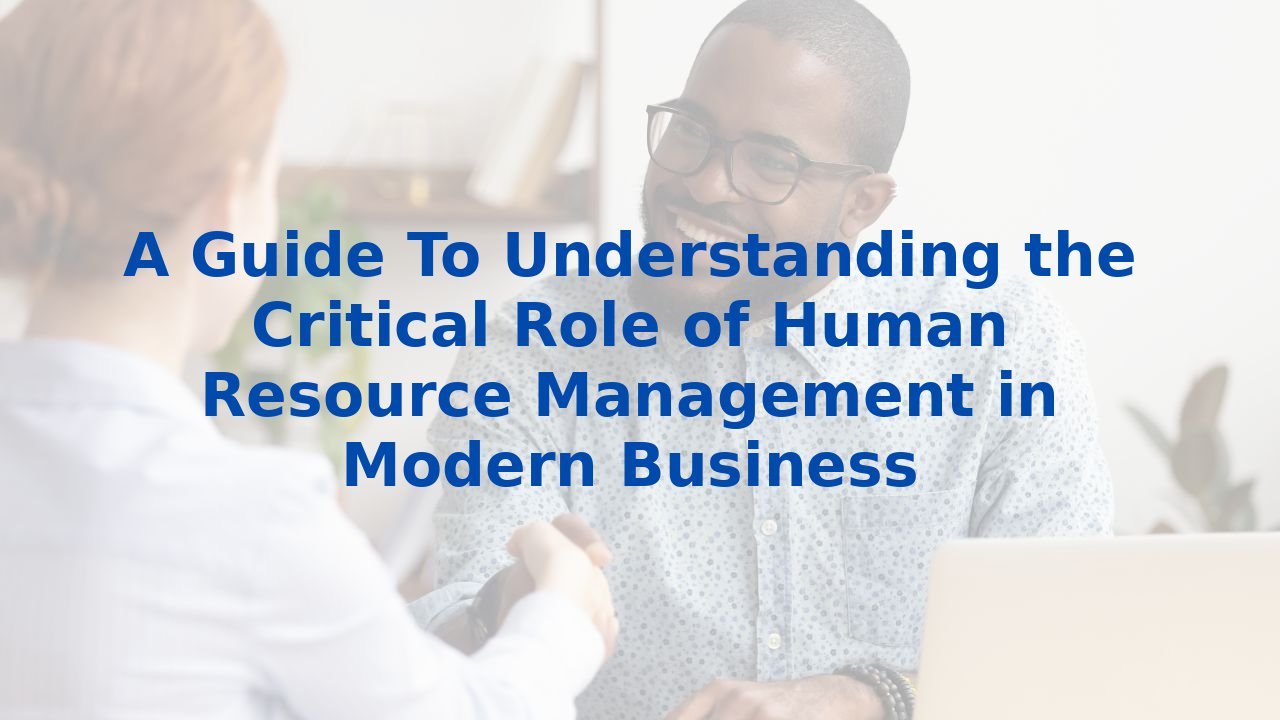A Guide To Understanding the Critical Role of Human Resource Management in Modern Business
A Guide To Understanding the Critical Role of Human Resource Management in Modern Business
Introduction
In a world that is evolving at breakneck speed, the significance of human resource management (HRM) can’t be overstated. Beyond simply overseeing employee relations, effective HRM is about shaping a workforce that not only meets today’s demands but is also prepared for tomorrow's challenges. This post will explore the essential functions of HRM and demonstrate how artificial intelligence (AI) enhances these functions to streamline business processes and drive efficiency.
The Role of Human Resource Management
Understanding HRM is fundamental to grasping its impact on an organization:
- Talent Acquisition and Retention: Attracting the right talent is at the heart of HRM. Well-crafted strategies enable companies to identify potential employees efficiently, facilitating a hiring process that minimizes time-to-fill while creating an environment that encourages retention.
- Employee Development: Investing in employee growth is not just beneficial; it's imperative. This encompasses training initiatives, mentorship programs, and clear paths for advancement that foster skill acquisition and promote loyalty.
- Performance Management: Continuous performance evaluations are vital. They allow organizations to discern individual contributions, motivating employees while aligning their goals with those of the company.
- Employee Engagement: Keeping morale high is essential for productivity. Effective HRM generates a climate that values communication, feedback, and employee well-being.
How AI Enhances Human Resource Management
AI is revolutionizing HRM, and the implications are significant:
- Automated Recruitment: The traditional recruitment process is often lengthy and cumbersome. AI can streamline this by screening resumes and managing initial candidate interactions, which accelerates hiring while sparing HR teams from repetitive tasks.
- Predictive Analytics: By leveraging data analytics, AI can forecast employee turnover and suggest tailored strategies to improve retention. This foresight empowers organizations to proactively address potential challenges.
- Performance Monitoring: AI enhances the ability to monitor employee performance in real-time. This constant insight affords HR teams a holistic understanding of employee productivity and engagement levels.
- Personalized Employee Experience: Tailored experiences in training, feedback, and development plans can significantly enhance employee satisfaction. AI’s ability to analyze individual preferences allows for highly personalized interactions.
Benefits of AI in HRM
The integration of AI into HRM doesn’t just streamline processes; it introduces numerous benefits:
- Efficiency Gains: Through automation, HR personnel can prioritize strategic initiatives, effectively increasing overall productivity and achieving operational savings.
- Accuracy and Consistency: AI minimizes human errors through the application of algorithms, ensuring a higher level of consistency in tasks ranging from recruitment to performance appraisals.
- Real-Time Decisions: With immediate access to analyzed data, HR teams can swiftly pivot their strategies in response to evolving business needs or unforeseen challenges.
The Importance of Training Employees for AI
As organizations embrace AI, employee training becomes a cornerstone of success:
- Adoption and Integration: Training equips employees to harness AI tools effectively. This learning curve minimizes potential disruptions, allowing organizations to reap the full benefits of technological integration.
- Skill Development: As routine tasks are automated, employees' roles will shift toward more analytical and strategic functions. Training must evolve to equip them with skills such as data interpretation and creative problem-solving.
- Enhanced Productivity: Employees trained in AI tools can prioritize creative and strategic projects, leading not only to a more fulfilling work experience but also increased output.
Conclusion
In summary, human resource management is more than a back-office function; it is an integral element of a successful business model. The infusion of AI into HRM processes leads to enhanced efficiency, accuracy, and informed decision-making. By automating mundane tasks, providing predictive insights, and personalizing employee interactions, AI is redefining how HR operates. Moreover, fostering a culture of training ensures that employees not only adapt to these technological advancements but also thrive. The result is a dynamic, engaged workforce ready to navigate the challenges of the future.
Transform your HR processes today. Explore comprehensive training programs that can equip your entire organization with AI skills for a competitive edge. Discover more here.



